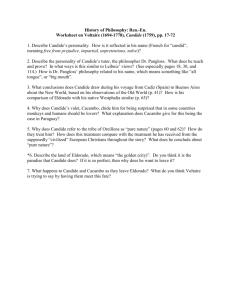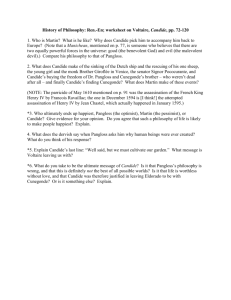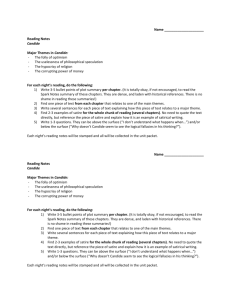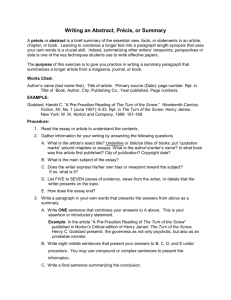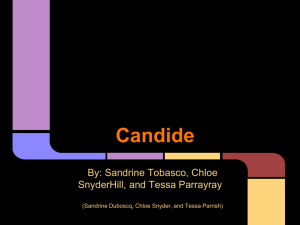Candide
advertisement
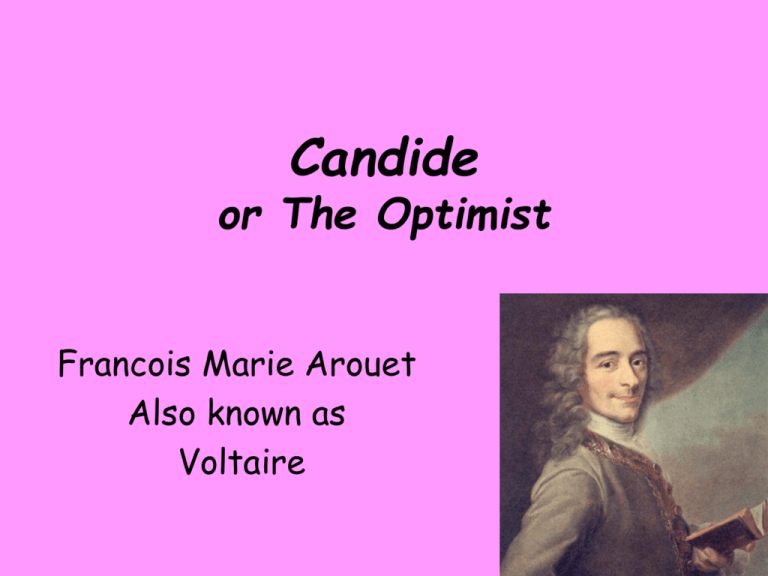
Candide or The Optimist Francois Marie Arouet Also known as Voltaire Author Biography • Voltaire was a satirist and a French Enlightenment philosopher • He was known particularly for his satirical wit • He was a proponent of religious freedom and opposed tyrannical governments • As such, Candide, (C. 1757-1758), became part of a large, diverse body of philosophical, political and artistic works expressing these views Candide • The novella is known for its sarcastic tone, erratic, fantastical, and fast moving plot. • It parodies many cliché romances and adventures • Yet, events are based on actual historic occurrences such as The Seven Years War and the Lisbon earthquake • Voltaire deals with the problems, evils and concerns of the time period through satire, parody, humor and allegory Criticism of Optimism or sometimes referred to as Panglossianism • Philosopher and mathematician Leibniz is criticized through the character, Pangloss, who reiterates throughout the novella the mantra ‘all is for the best in the best of all possible worlds.’ • The horrors of the war and the Lisbon earthquake did not apply to this view of optimism Candide parallels the ideas brought forth in Jonathan Swift’s Gulliver’s Travels (1726). Gulliver is a gullible protagonist, that travels to distant lands, like Candide, and is hardened by the experience – Voltaire was undoubtedly inspired by this work. Characters • Candide – protagonist, naïve young man, whose faith in the oft uttered ‘all is for the best…” optimistic mantra of his tutor Pangloss is perpetually tested, he pursues his beloved Cunegonde and faith throughout the novella • Pangloss – Candide’s tutor who is an optimist and philosopher, he is also the parody of certain philosophers of the time (Leibniz), and the vehicle for the satire Characters cont’d • Martin – the cynical scholar and traveling companion of Candide. His philosophies diametrically oppose the Panglossian philosophy as being entirely pessimistic. • Cunegonde – the Baron’s daughter with whom Candide falls in love, simplistic; woe befalls her when her father’s estate is destroyed and she is taken as a slave during the war. The Baron had taken Candide in and raised him, but threw him out after he fell in love with Cunegonde Cacambo - Candide's valet when Candide travels in South America. A mixed-race native of the America’s, highly intelligent, morally honest; rescues Candide from a number of scrapes and is responsible for Candide's reunion with Cunégonde. Provides direct contrast to ineffectual philosophers such as Pangloss and Martin. The old woman - daughter of a Pope, has experienced the death of a fiancé, rape by pirates, slavery, and cannibalism in wartime, she becomes Cunégonde's servant, misfortunes made her cynical about human nature, but she doesn’t give in to self-pity, wise, practical, and loyal to her mistress. Though she has often been close to suicide, she always finds a reason to live. Characters cont’d The Commander or the baron - Cunégonde's brother; after his family's castle is destroyed in wartime, he becomes a Jesuit priest. It is implied numerous times that he has homosexual tendencies. He is arrogant about his family's noble lineage and likes Candide but refuses to allow him to marry his sister. Jacques (the Anabaptist) - humane Dutch Anabaptist, cares for the itinerant Candide and Pangloss; despite his kindness he is pessimistic about human nature, he drowns in the Bay of Lisbon while trying to save the life of an ungrateful sailor. Characters cont’d The farmer - The farmer has a modest farm outside Constantinople. Candide and his friends are impressed with his lifestyle of hard work and simple pleasures, and adopt it for themselves. Count Pococurante - The count is a wealthy Venetian. He has a marvelous collection of art and literature, but he is bored with and critical of everything. Characters cont’d Paquette - she is initially the chambermaid of Cunégonde's mother, has an affair with Pangloss and gives him syphilis, and eventually turns to prostitution to support herself, Brother Giroflée is one of her clients. In Venice, Candide is moved by Paquette's misery gives her a great deal of money, which she quickly squanders. Characters cont’d Brother Giroflée - dissatisfied monk that parents forced into a monastery to enlarge his brother's fortune, Paquette's client, and like her, he is miserable and does not get any happier after Candide gives him a large sum of money. The Grand Inquisitor - an important figure in the Portuguese Catholic Church that represents the hypocrisy of religious leaders. He uses the threat of religious oppression to force the Jew Don Issachar to share Cunégonde with him. Meanwhile, he orders that suspected heretics be burned alive. Candide kills the Inquisitor when the Inquisitor discovers him with Cunégonde. Characters cont’d Don Issachar - a wealthy Jew, that purchases Cunégonde and makes her his mistress. The Grand Inquisitor forces him to share Cunégonde by threatening to burn him alive as a heretic. Candide kills Don Issachar when he interrupts Candide and Cunégonde. Don Fernando d'Ibaraa y Figueora y Mascarenes y Lampourdos y Souza - governor of Buenos Aires, who becomes infatuated with Cunégonde and makes her his mistress despite her engagement to Candide. Characters cont’d Vanderdendur - a cruel slave owner and an unscrupulous merchant, after stealing one of Candide's jewel-laden sheep, his ship is sunk in a battle. Candide sees his death as a sign that retributive justice is at work in the world. The Abbé of Perigord - a Paris socialite who cheats Candide out of his money. The Marquise of Parolignac - a cunning, sexually licentious Paris socialite. She seduces Candide and steals some of his jeweled rings. Modern Adaptations of Candide • Candide the operetta was conceived by the playwright Lillian Hellman • Leonard Bernstein, the American composer and conductor convinced Hellman to do it as a comic operetta • In the derivative work it opened on Broadway in 1956 although criticized as too serious, it was revitalized with a new libretto nearly 20 years later and enjoyed critical acclaim Themes • The Uselessness of Philosophical Speculation • The Folly of Optimism • The Corrupting Power of Money • The Hypocrisy of Religion Motifs • Resurrection •Rape and Sexual Exploitation •Religious and Political Oppression Symbols Pangloss is less a well-rounded, realistic character than a symbol of a certain kind of philosopher. His optimism and logical fallacies are meant to represent the thought of G.W. von Leibniz and other Enlightenment thinkers. He is an open symbol of the folly both of blind optimism and of excessive abstract speculation. Symbols The Garden At the end of the novel, Candide and his companions find happiness in raising vegetables in their garden. The symbolic of the Garden of Eden, in which Adam and Eve enjoyed perfect bliss before their fall from God's grace. However, in Candide the garden marks the end of the characters' trials, while for Adam and Eve it is the place where their troubles begin. Moreover, in the Garden of Eden Adam and Eve enjoyed the fruits of nature without having to work, whereas the main virtue of Candide's garden is that it forces the characters to do hard, simple labor. In the world outside the garden, people suffer and are rewarded for no discernible cause. In the garden, however, cause and effect are easy to determine—careful planting and cultivation yield good produce. Finally, the garden represents the cultivation and propagation of life, which, despite all their misery, the characters choose to embrace. Symbols The Lisbon Earthquake The earthquake in Candide is based on a real earthquake that leveled the city of Lisbon in 1755. Before writing Candide, Voltaire wrote a long poem about that event, which he interpreted as a sign of God's indifference or even cruelty toward humanity. The earthquake represents all devastating natural events for which no reasonable justification can be found, though thinkers like Pangloss might do their best to fabricate flimsy justifications in order to maintain a philosophical approach to life. Works Cited • http://en.wikipedia.org/wiki/Candide http://www.sparknotes.com/lit/candid/ context.html

